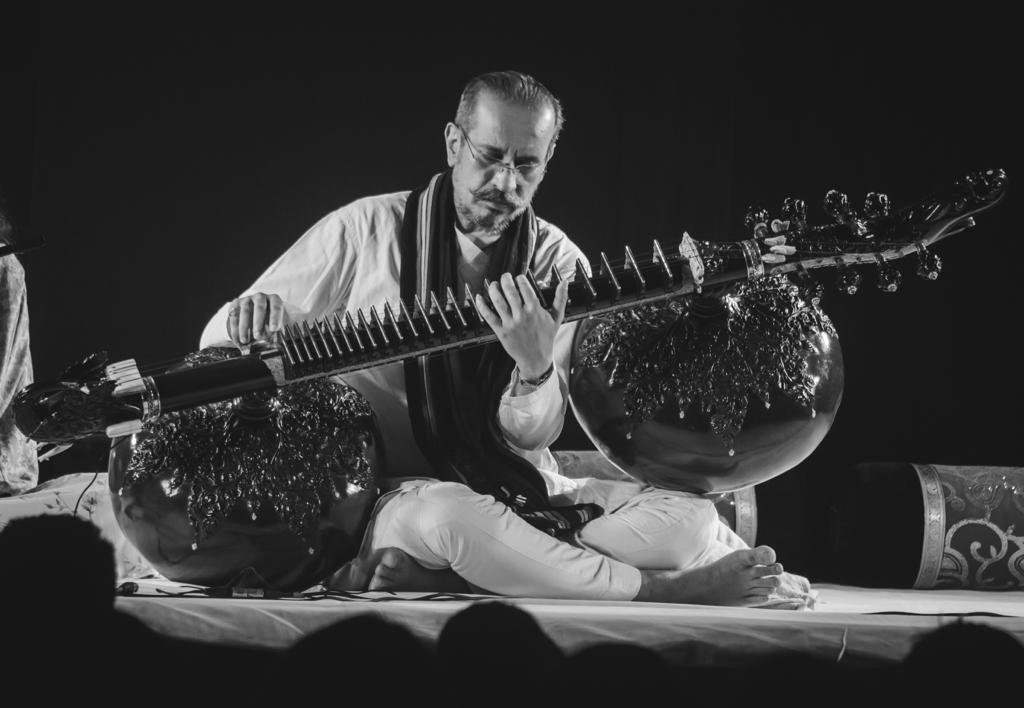Bahauddin Dagar

Church of St. Luke and St. Matthew's
Copresented by FourOneOne
Ustad MOHI BAHAUDDIN DAGAR is widely recognized as the most virtuosic performer of the rudra veena living today and a torchbearer of his family’s dhrupad lineage dating back to the sixteenth century. Bahauddin is the son of the illustrious rudra veena player and teacher Ustad Zia Mohiuddin Dagar, who alongside his brother, renowned vocalist Ustad Zia Fariduddin Dagar, sparked a revival of the instrument while changing the very nature of its use in performance. Since making his formal debut as a musician in 1990, Bahauddin has become acclaimed for his highly responsive, contemplative playing style; prayerful and expansive sound; and commitment to exploring and advancing dhrupad through innovations in instrument construction and technique.
Dhrupad, the oldest existing form of North Indian classical music, evolved from the recitation of the ancient vedic liturgical chant Sama Veda and was practiced predominantly as a vocal form; the dhrupad tradition of the Dagar family (Dagar vani) spans twenty generations. The rudra veena (also known as the bīn) is one of the oldest string instruments in Hindustani musical history, with a full-bodied structure and twenty-four individually-tuned frets producing delicate microtonal sound-worlds. For most of its history, it was used purely for vocal accompaniment and private study. It was only in the twentieth century that Zia Mohiuddin Dagar introduced its use as a solo instrument for public listening. Following India’s independence in 1947 and the abolition of princely states, the patronage system supporting the dhrupad tradition disintegrated. Members of the Dagar family settled in multiple regions; Zia Mohiuddin and Zia Fariduddin relocated to Mumbai, and for years worked as mechanics, bread-sellers, and occasional film orchestra accompanists. Despite limited access to instruments, the family maintained a musical discipline and was eventually able to return to full- time musicianship. Starting in the 1960s and 1970s, Western interest in dhrupad and the Dagar tradition in particular grew among musicologists and performer-composers such as Don Cherry and Sonny Rollins, who each visited Mumbai for informal training.
Born in Mumbai in 1970, Bahauddin Dagar began study of the sitar at age seven with his mother, Smt. Pramila Dagar, and the rudra veena at age twelve with his father, and vocal dhrupad performance from his uncle, Ustad Zia Fariduddin Dagar. Bahauddin teaches both vocal and instrumental music to a new generation of musicians and enthusiasts in the traditional Guru-Shishya parampara style gurukul, an in-residence learning facility for musical instruction started by his father and uncle in Palaspe, outside Mumbai. Bahauddin also continues to work under Pandit Pushparaj Koshti, another disciple of his father. He is currently studying the sursingar, an early sarod-like bass instrument, toward the goal of reintroducing it into public performance. Among the many highlights of his career, he has received the 2012 Sangeet Natak Akademi Award, the highest-order prize for the arts in India, and was featured on the television show Harmony with A. R. Rahman beside the famed film composer in 2018.
He will be joined by Ted Morano (tanpura) and Tejas Topes (pakhawaj).
The main entrance is up five steps of stairs. Alternatively, arrangements can be made to access a side ramp after a single step. Once inside, the women's restroom is up three steps and the men's restroom is down a flight of stairs. Please be in touch with jade@blankforms.org with access requests and we will do our best to accommodate.
Thank you to Heirloom Brooklyn for donating a rug to the performance.
